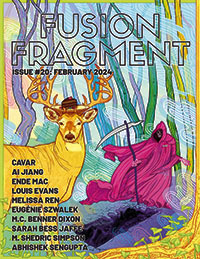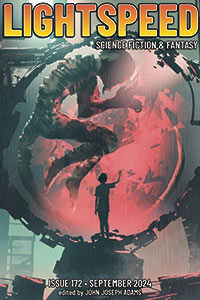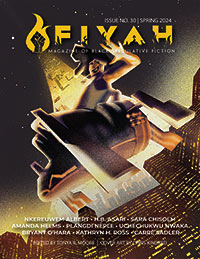The Year in Review 2024 by Charles Payseur

I’d be lying if I said I was in a particularly great mental space to look back at the previous year with anything like insight or objectivity. Not only for the most obvious reasons, but because the year took it out of me in ways personal and rather profound. Of course, that seems to be largely par for the course for the last decade, which fittingly coincides with the years I’ve spent reviewing short fiction. It seems that for me, reading short speculative fiction has always been something of a coping mechanism, and reviewing my way of processing and reflecting not just on fiction, by on myself and the world around me. In that vein, I’d like to spend this space basically thanking some of the stories that have really helped me through 2024.
 And while it’s always impossible for me to pick a favorite story or read of the year, one that has been most in my thoughts has probably been B. Pladek’s ‘‘The Spindle of Necessity’’ from the May Strange Horizons. Aside from being a compelling story about desire, dreams, and academia, the work is very much about something that speaks to me as a reader and reviewer – being Wrong. Not just not sufficiently grounded in a reading of a text, or rigorously considered, but something else – something deeper. Especially where yearning and queerness and criticism all intersect, the story shows a character finding this great well of meaning and significance only to be locked in a kind of intellectual and emotional paralysis because of how their interpretations and head canons might seem to others – ignorant, privileged, and toxic. And watching that play out, and experiencing how Pladek guides readers through that situation, is intensely provocative and, for me, rewarding.
And while it’s always impossible for me to pick a favorite story or read of the year, one that has been most in my thoughts has probably been B. Pladek’s ‘‘The Spindle of Necessity’’ from the May Strange Horizons. Aside from being a compelling story about desire, dreams, and academia, the work is very much about something that speaks to me as a reader and reviewer – being Wrong. Not just not sufficiently grounded in a reading of a text, or rigorously considered, but something else – something deeper. Especially where yearning and queerness and criticism all intersect, the story shows a character finding this great well of meaning and significance only to be locked in a kind of intellectual and emotional paralysis because of how their interpretations and head canons might seem to others – ignorant, privileged, and toxic. And watching that play out, and experiencing how Pladek guides readers through that situation, is intensely provocative and, for me, rewarding.
Another of the stories that has stuck with me is ‘‘Show Goes On’’ by Louis Evans from the February Fusion Fragment. Part coming -of-age, part C-list Hollywood drama, set in a world with incredibly dangerous superheroes and villains, I am struck by the character work and the feeling of having peaked too soon. The main character is a former child actor who largely washed out of acting and show business entirely until a strange encounter with the world’s deadliest villain sets him up for one hell of a comeback. The story is built around a joke, and really shows how the joke structure can work with short fiction, setting all this detail up to pay off in a fairly unexpected way at the end. It’s also a lovely and beautiful take on feeling done and tired and hopeless and getting a second chance and realizing that, as the title says, the show goes on. It’s at turns ridiculous and tender, and Evans does such a good job bringing it all together. If it’s fallen outside your reading, I do recommend reaching back and checking it out.
 I am also a sucker for a good metatextual story, and one of the best of 2024 was Gabriela Santiago’s ‘‘Reconstructing ‘The Goldenrod Conspiracy,’ Edina Room, Saturday 2:30-3:30’’ in the September Lightspeed. Framed as the transcript of a convention panel, the piece engages with fandom, with censorship, and with trying to piece together a history that has been distorted by authoritarian and fascist regimes. What has been saved has been so because of the work of individuals hoping to preserve their love and passion – and also by those very regimes who were trying to keep potentially subversive works from their citizenry. It complicates the way these fans treat the rediscovery of ‘‘lost’’ episodes and material for their favorite show, and confronts readers with the complicated lines of art, politics, and fandom. Santiago excels at unconventional structures, and especially those that revolve around popular culture, as this story once again demonstrates.
I am also a sucker for a good metatextual story, and one of the best of 2024 was Gabriela Santiago’s ‘‘Reconstructing ‘The Goldenrod Conspiracy,’ Edina Room, Saturday 2:30-3:30’’ in the September Lightspeed. Framed as the transcript of a convention panel, the piece engages with fandom, with censorship, and with trying to piece together a history that has been distorted by authoritarian and fascist regimes. What has been saved has been so because of the work of individuals hoping to preserve their love and passion – and also by those very regimes who were trying to keep potentially subversive works from their citizenry. It complicates the way these fans treat the rediscovery of ‘‘lost’’ episodes and material for their favorite show, and confronts readers with the complicated lines of art, politics, and fandom. Santiago excels at unconventional structures, and especially those that revolve around popular culture, as this story once again demonstrates.
GigaNotoSaurus had another strong year, and one of my favorites from the venue is R.Z. Held’s ‘‘To Sacrifice Others’’, which takes a very careful but sharp look at complicity, risk, and loss as a character in the middle of a vast and terrible military has to contend with their desire to fight back and their need to stay alive to do that. They have been co-opted by the enemy, but remain able to exercise their free will thanks to a quirk in their medical history, and they are desperate to find a way to push back against the colonizing terror that they now assist. When the opportunity presents itself, they have to do what they can, but also carry the weight of what they’ve done and what they’ve failed to do. For me, the story really digs into what it means to resist from the inside of something engaged in atrocity. But it does not forgive people just for trying – rather, Held provides an incredibly complex and intense look at what sacrifice means, and what it means to the different people caught in conflict, often with little individual power to really effect change. It’s brilliant.
 And finally, Uchechukwu Nwaka’s ‘‘No Happy Endings for Chasers’’ in the April Fiyah echoes some of the themes from Held’s story, but from a much different place. The main character is still trapped, but by circumstance rather than the enemy, and by his own conflicting senses of identity and desire. He takes up the dangerous profession of alien-hunting in part to prove to his father and himself that he’s not weak or womanly because of his sexuality, but in embracing this aggressive and violent masculinity he’s not only erasing a part of himself – he’s also putting himself in danger for an acceptance and approval that will never come. Just as an escape from poverty is a carrot used to further exploit him, the promise of seeming manly and brave just leads him further into self-loathing and false bravado, which are poor armors against not only the prejudices of the world but also the rending claws and teeth of the aliens he’s at war with. Nwaka pens a tense and thrilling story that still shows a rich depth of character and emotion.
And finally, Uchechukwu Nwaka’s ‘‘No Happy Endings for Chasers’’ in the April Fiyah echoes some of the themes from Held’s story, but from a much different place. The main character is still trapped, but by circumstance rather than the enemy, and by his own conflicting senses of identity and desire. He takes up the dangerous profession of alien-hunting in part to prove to his father and himself that he’s not weak or womanly because of his sexuality, but in embracing this aggressive and violent masculinity he’s not only erasing a part of himself – he’s also putting himself in danger for an acceptance and approval that will never come. Just as an escape from poverty is a carrot used to further exploit him, the promise of seeming manly and brave just leads him further into self-loathing and false bravado, which are poor armors against not only the prejudices of the world but also the rending claws and teeth of the aliens he’s at war with. Nwaka pens a tense and thrilling story that still shows a rich depth of character and emotion.
There are many other stories that I deeply loved from 2024. And one of the problems with being a short fiction reviewer is knowing that, despite the many stories I’ve read, there are so many others that I just couldn’t get to, and likely would have loved dearly as well. But still, despite everything, stories like these are what keep me coming back, week after week, month after month, year after year, to have the joy of discovering how authors are pushing boundaries and just making excellent art with their words. I am humbled to be able to have a small part in helping to spread awareness of what’s being written, and I hope to keep doing this for some time to come. Cheers!
Charles Payseur is an avid reader, writer, and reviewer of speculative fiction. His works have appeared in The Best American Science Fiction and Fantasy, Lightspeed Magazine, and Beneath Ceaseless Skies, among others, and many are included in his debut collection, The Burning Day and Other Strange Stories (Lethe Press 2021). He is the series editor of We’re Here: The Best Queer Speculative Fiction (Neon Hemlock Press) and a multiple-time Hugo and Ignyte Award finalist for his work at Quick Sip Reviews. When not drunkenly discussing Goosebumps, X-Men comic books, and his cats on his Patreon (/quicksipreviews) and Twitter (@ClowderofTwo), he can probably found raising a beer with his husband, Matt, in their home in Eau Claire, Wisconsin.
This review and more like it in the February 2025 issue of Locus.
 While you are here, please take a moment to support Locus with a one-time or recurring donation. We rely on reader donations to keep the magazine and site going, and would like to keep the site paywall free, but WE NEED YOUR FINANCIAL SUPPORT to continue quality coverage of the science fiction and fantasy field.
While you are here, please take a moment to support Locus with a one-time or recurring donation. We rely on reader donations to keep the magazine and site going, and would like to keep the site paywall free, but WE NEED YOUR FINANCIAL SUPPORT to continue quality coverage of the science fiction and fantasy field.
©Locus Magazine. Copyrighted material may not be republished without permission of LSFF.







